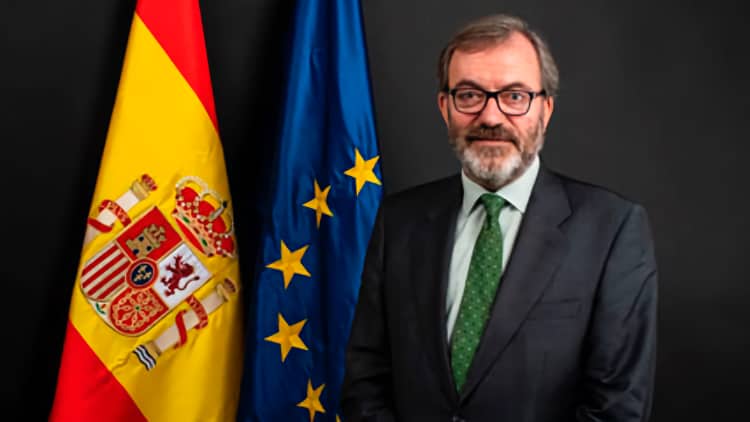Luis Ayllón
The Government will ask the Russian authorities for their approval to appoint Ricardo Martínez as the new ambassador to Moscow, replacing Marcos Gómez, who has held the post for the past two and a half years, The Diplomat has learnt from reliable sources..
Ricardo Martínez recently stepped down as ambassador in Berlin, following the appointment of Pascual Navarro to the post.
The sources consulted indicated that the Executive could have decided to replace the ambassador before the time he usually has to spend in a country of Russia’s importance, which is around four years, due to the circumstances in which he has had to carry out his work.
Gómez was appointed ambassador to Moscow in October 2021, after the Minister of Foreign Affairs, José Manuel Albares, in agreement with the President of the Government, Pedro Sánchez, decided to withdraw the request for the post made for Camilo Villarino, who had then been chief of staff to the previous head of Foreign Affairs, Arancha González Laya. Villarino, now head of His Majesty the King’s Household, was involved in a legal case, from which he was later acquitted, for the entry into Spain of Polisario Front leader Brahim Ghali, and the Sánchez government did not want to take any risk.
Marcos Gómez has lived through the invasion of Ukraine by Russia from the Embassy in Moscow and has seen how the diplomatic representation has been significantly affected since May 2022, after Russia decided to expel 27 people who worked there, 15 of whom had diplomatic passports. Russian President Vladimir Putin reacted in this way in reciprocity to the Spanish government’s decision to expel 27 diplomats from its embassy in Madrid.
The decision to change ambassadors in Moscow comes almost at the same time as the Spanish government’s decision to summon the Russian ambassador in Madrid, Yuri Klimenko, to ask for explanations for the death of opposition leader Alexei Navani.
Relations between the two countries are not at their best at the moment, so it is foreseeable that the granting of Ricardo Martínez’s ‘plácet’ will be delayed for some months, especially if the Russian authorities decide to act as Spain did, which took four months to grant Klimenko’s ‘plácet’.
Ricardo Martínez (Seville, 1958), a veteran diplomat with good connections to the PSOE, has served as ambassador to Germany for almost five and a half years. A diplomat since 1986, he had previously been posted to the embassy in Bonn, then capital of the Federal Republic of Germany, between 1987 and 1990, which allowed him to closely follow the German unification process.
He holds a law degree from the University of Seville and completed postgraduate studies at the Human Rights Directorate of the Council of Europe, at the René Cassin Institute in Strasbourg (France) and at the Academy of International Law in The Hague (Netherlands).
He was posted to the Directorate General for International Economic Relations, the Diplomatic Information Office (OID) and the Spanish Agency for International Cooperation, where between 2000 and 2008 he held the positions of Deputy Director General for Cooperation with Eastern Europe and Asia, Deputy Director General for Cooperation with Mediterranean and Eastern European Countries and Director General for Cooperation with Africa, Asia and Eastern Europe. Between 2008 and 2012 he held the post of director general of Casa África.
Abroad, he was posted to the Permanent Representation of Spain to International Organisations in Geneva and to the Spanish Embassy in Panama.
He was also consul general in São Paulo (Brazil) and consul general in Edinburgh, a post in which he had to closely monitor the presence of the former Catalan councillor Clara Ponsatí, who had fled to the Scottish capital.







